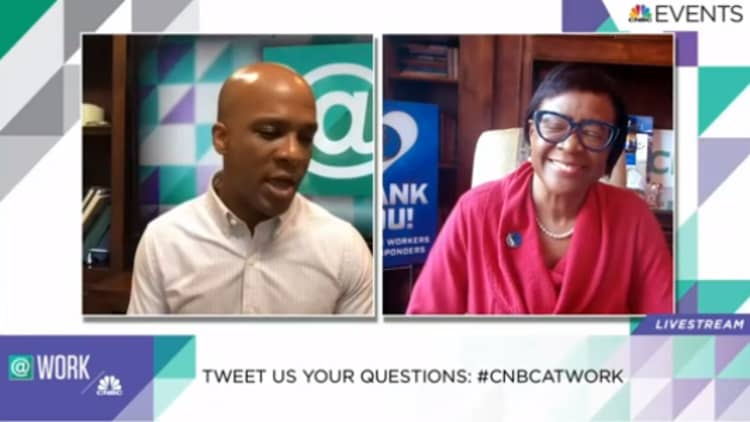The mass migration to remote work helped companies solve a major coronavirus challenge, but the recent civil unrest has exposed diversity and opportunity gaps across the U.S., which telecommuting is beginning to exacerbate. Low-income students and students of color entering the workforce are struggling to overcome a telecommuting digital divide.
The data is starting to back up the personal experience. A WayUp survey in April 2020 highlighted that Black and Hispanic college students and recent grads are much less comfortable with virtual work than their White peers.
"Now that I'm back home in Illinois living with my mom, I'm in a very tiny apartment where there is no separation between eat, work and sleep. ... If I want privacy, it doesn't exist," said Ibrahim Mokhtar, a Black student at the University of Southern California who is spending his summer interning remotely with the nonprofit organization GiveDuet.
Remote work capability as top concern
The WayUp survey indicated that among all students, how capable they are of working remotely is a top concern, but Black and Hispanic students were 145% more likely than White peers to express this issue. Among respondents who indicated that they were most concerned about being able to perform a remote internship, over half were Black or Hispanic.
Respondents also identified a lack of physical space to work as a key issue. Census data shows that Black households have 20% more people and Hispanic households have 80% more people compared to White households, which can result in concerns about background noise, distractions, as well as the basic concern about lack of space.
Zamir Ramirez, who is Mexican American and navigating his first year working full-time at Nickelodeon Animation from home, said space is vital for his working environment but hard to find. "For low-income families like my own, finding a room to work in is difficult. It can be cramped, it's usually a room that's used as storage, and there's no real sense of privacy. That already does a lot in terms of the psyche," Ramirez said.
"We have a big family of kids, so anywhere I go, I'm pretty much around loud kids going buck wild," said Destiney Johnson, a junior at Grambling State University who identifies as Black. She relocated to a relative's house to do her immersive research internship program with Florida International University this summer. "I realized I could get in a better situation living elsewhere," Johnson said.
Technology barriers
Access to technology has made remote work particularly difficult for members of low-income families. The 82% of White adults in the U.S. who report owning a desktop or laptop computer compares to 58% of Blacks and 57% of Hispanics who indicated the same in a 2019 Pew Research Center survey. Black (66%) and Hispanic (61%) respondents in the Pew survey reported having broadband internet, versus 79% of White adults.
"Financially, having good internet where you can keep your camera and audio on for Zoom and other things is difficult, especially when everyone is on their devices at the same time." Mokhtar said.
The financial stress caused by the pandemic has made these work-related expenditures an ever greater challenge.
"The hidden costs that people never talk about, like internet or even a desk, are huge," he said.
To compensate for the financial burden of setting up a work-from-home space, Mokhtar was able to receive a CARES Act emergency grant through USC. The Coronavirus Aid, Relief and Economic Security Act's Higher Education Emergency Relief Fund was distributed to universities across the U.S. for students facing hardships as a result of the pandemic. USC students who have filed or can file for Federal Student Aid also qualify for this grant and are eligible to receive up to $3,000 each in aid.
"Thankfully, I had savings from my past internships and on-campus jobs, but getting funding from the school was a very big help," Mokhtar said.
Career development and 'code-switching'
For Ramirez, one of the biggest hurdles of being a new full-time employee remotely is having opportunities to connect with co-workers and managers. "Young professionals need to network and develop relationships with their bosses — that's what the first year is used for," he said. "At home that disconnected is felt. It's much more difficult to reach out to people without feeling like I'm encroaching on their time."
As there is more talk of "living at work" overwhelming a more balanced "work from home" environment, there are specific difficulties that young workers from underrepresented minorities face when their worlds of work and home are the same.
Christine Cruzvergara, vice president at jobs platform Handshake — which connects students and university career offices to employers, a "LinkedIn for college" — said every student deals with uncertainty when starting a new job, but additional barriers for students of color in a virtual workplace will need to be addressed.
Corporate culture can be harder to learn remotely, she said, giving as an example the concept of code-switching — changing languages or language styles in different settings — can be particularly prevalent for students of diverse backgrounds, who feel the need to switch from their own vernacular to a workplace standard.
"Some might have to code-switch in the workplace and determine how to do that when they're mostly on email and phone calls with limited body language to read," Cruzvergara said. "They're going to have to find other cues to give them a sense of what the culture is like and how to navigate it in terms of their conversations and their relationships."
For Jephtha Prempeh, a Black student from USC who recently started a remote internship with Bloomberg Associates, the government-focused consulting arm of Michael Bloomberg's Bloomberg Philanthropies, being home with family and working from a bedroom makes code-switching even more complicated. "I do feel self-conscious about if I sound intelligent, but speaking differently and approaching things differently does change my home space, and I can't shake it off when the day is done. I don't have that fresh space to come back and be myself," Prempeh said.
Students are often afraid to ask and jeopardize their internship. Help your employer understand your situation. Don't try to cover it up.Everette Fortnerassociate vice president at the University of Virginia's career center
Despite socioeconomic gaps making remote work challenging, many students feel supported in their roles, both with material resources and emotional support. "I would be absolutely unable to take care of myself mentally and get the work done if it wasn't for the fact that I have a very understanding and reasonable boss and team," Mokhtar said. "I'm able to communicate with everyone on the team pretty easily, so they know what I'm dealing with."
Everette Fortner, associate vice president at the University of Virginia's career center encourages students to speak up to their managers about their concerns with remote work. "Students are often afraid to ask and jeopardize their internship. Help your employer understand your situation. Don't try to cover it up. ... It's a matter of continually communicating with your manager about how to best get your work done in the living situation you're in," Fortner said.
Johnson said her program spoke to each intern prior to their start date to ensure they had all of the resources they needed for work, and were even provided a stipend to cover for any additional supplies. "I was worried if I was going to be prepared and have everything I needed to do a good job, so I'm really happy they took that into consideration," she said.
The diversity and inclusion push in the workplace needs to start from the hiring process taking into account the digital divide. "If you want to recruit and manage a diverse group of people, you need to ensure you're not only sourcing those candidates, but that you're also interviewing them in a way that removes as much bias as possible," said Liz Wessel, co-founder and CEO of WayUp. She said the remote environment can be used to help diversity efforts, as hiring managers can use technology to access a wider range of diverse candidates without the physical and financial barriers of travel.

While companies figure out the best way to accommodate these transitions, Johnson advised her student peers to use university resources and social networks to find opportunities and get connected with employers. "Check in with school advisors and counselors; they have more resources and are ready to help," she said.
University career services connect students directly with employers, and can also provide additional funding to support students in unpaid internships. UVA is among the numerous universities which, in addition to providing federal emergency relief funding, offer parent-sponsored and provost-sponsored grants and scholarships of up to $5,000 based on the needs of the student and the industry they are working in.
"Our absolute priority is making sure students, particularly first-generation and low-income students, can financially afford to get the same experiences as everyone else, especially during these times," said UVA's Fortner. The school's career center had an extended grant application deadline this year to accommodate the number of students whose internship plans had changed or became unpaid. "We strongly encourage students to sit with a career counselor and turn over every stone we have for financing their internship," he said.
With many large employers laying the foundation for a permanent shift to a remote working environment, diversity and inclusion planning needs to be a component of the shift.
For Johnson and other students who had initial concerns about working remotely, communicating with hiring managers and tapping into university resources has allowed them to overcome initial challenges and excel in their endeavors. "Everyone has been so helpful and motivating, always encouraging us that we could do it despite what's going on around us," she said.
For more on tech, transformation and the future of work, join the most influential voices disrupting the next decade of work at the next CNBC @Work Summit this October.







